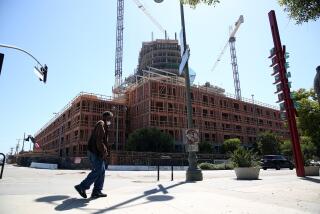U.S. Population Boom to Create Real Estate Need
- Share via
Huge demand for new apartments, office buildings, warehouses and other commercial properties will build over the next 30 years as the U.S. population increases 26%, according to a speaker at the National Assn. of Real Estate Investment Trusts’ annual convention last week in Los Angeles.
But it remains to be seen if that big boost to the real estate industry will do anything for long-depressed stock prices of real estate investment trusts. That continuing slump was a recurring lament throughout the three-day event, where REIT executives, stock market analysts and other real estate businesspeople gathered.
The impact of U.S. population growth and other demographic changes was discussed by M. Leanne Lachman, New York-based managing director of Boston Financial, a real estate asset management firm. She said REITs will benefit from a steady increase in the U.S. population, which is expected to grow from 275 million in 2000 to 347 million in 2030.
The increase of 72 million people averages more than 2 million a year, or “the equivalent of a new Denver metropolitan area every year,” Lachman said. She said that will mean a big demand for many, if not most, of the types of properties that REITs typically own: apartments, office and industrial buildings, and shopping centers.
Lachman pointed out that the U.S. population won’t just be growing, however, it will be changing in character.
“By 2030, there will be no dominant generation. The population will be more evenly distributed,” Lachman said, meaning baby boomers, who have long represented the biggest portion of the U.S. population, will be just another group.
Besides being more evenly distributed according to age, Lachman said, the future U.S. population will also be composed of many more distinct groups based upon race, country of origin, geographic location and urban or suburban lifestyles. She cited an E&Y; Kenneth Leventhal study showing that 60% of the country’s population growth through 2030 will be immigrants and their newborn children.
This means the real estate industry will need to serve many more distinct niches than it does today. Lachman compared it with the television industry and the fragmentation of the viewing audience into many different audiences served by specialized cable channels.
Lachman said one result of demographic changes will be an explosion in the number of “empty nesters,” for example, couples whose children have moved out and left them with a house that is presumably too big for just two people. That explosion will produce a big demand for whatever type of housing the empty nesters choose to move to, although it’s not clear if they’ll prefer apartments, condominiums or smaller single-family homes, Lachman said.
Lachman’s remarks reflected the upbeat assessment of current conditions in the real estate industry and optimism about the future that prevailed among speakers at the NAREIT convention regarding nearly every facet of their business.
Industry executives complained, however, that REIT stock prices remain stalled despite increased earnings and generally solid financial performances by a large percentage of REITs.
REIT executives and stock market analysts throughout the conference repeatedly referred to the “disconnect” between stock prices and the financial performance of the companies.
In general, they were at a loss to explain the disparity between stock prices and the performance of the real estate industry, which is enjoying strong demand for most property types, rising rents and low vacancy rates. Analysts said conservative estimates show that REIT stocks are priced 20% below the value of the underlying real estate assets.
One theory on REIT stock sluggishness was offered by John Lutzius, senior analyst at Green Street Advisors in Newport Beach, which specializes in REITs and other publicly traded real estate companies.
Lutzius said the market tends to price stocks according to what it believes their value will be in the future--up to two years down the road.
The stock market may simply believe that “many real estate markets are so good they can only trend toward getting worse,” Lutzius said. “We must remain respectful of the market’s ability to see around the corner.”
On the other hand, the market may simply be mistaken, said Eric Hemel, a Merrill Lynch & Co. analyst.
“The market can be wrong for long periods of time,” Hemel said. He cited the 1974-1982 bear market, a period in which, he said, many stocks were undervalued by the market.
Hemel contrasted the dismal performance of REIT stocks with the stellar results of Internet stocks, which have soared despite financial losses and the absence of underlying assets to support their values.
Both the lagging REIT prices and the zooming “dot-com” prices are “irrational,” Hemel said.
(BEGIN TEXT OF INFOBOX / INFOGRAPHIC)
Demand Up, Stocks Down
Despite huge demand forecast for real estate in the new decade, shares of real estate investment trusts have mostly been declining since mid-1997. Monthly closes and latest for the Bloomberg index of 149 major REIT shares:
Monday:
102.56
Source: Bloomberg News
More to Read
Inside the business of entertainment
The Wide Shot brings you news, analysis and insights on everything from streaming wars to production — and what it all means for the future.
You may occasionally receive promotional content from the Los Angeles Times.










